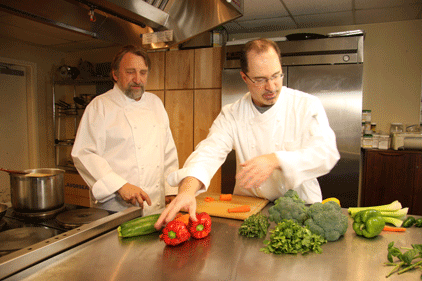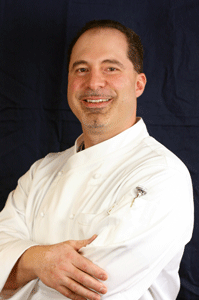Meet Chef Joseph
Education: University of Rhode Island, B.S. in Zoology Experience: Corporate chef for Papa Gino’s Pizzeria / D’Angelo Grilled Sandwichesrestaurant chain; consulting member ofThe Chef Services Group; executive chef at Camden Harbour Inn, Camden, Me. Associations: Member of Research Chefs Association (RCA), Refrigerated Foods Association (RFA), Institute of Food Technologists (IFT), International Foodservice Manufacturers Association (IFMA), International Dairy Deli and Bakery Association (IDDBA), International Foodservice Editorial Council (IFEC), National Association of College and University Food Services and Organic Trade Association (NACUFS) and Organic Trade Association (OTA) Where you’ll find him: Ascoli attends RCA, IFMA’s COEX Chain Operator Exchange, the National Restaurant Show, New England Restaurant Show, New York Restaurant Show, Fancy Food Show, Natural Products Expo (East and West), IDDBA’s annual Deli-Dairy-Bake convention and the National Association of College & University Food Services conference |

Prepared Foods’ Food for Thought is a new feature interview series involving food company R&D professionals, nutritionists, research chefs and other industry executives.
In this first edition, Food for Thought talks with Kettle Cuisine Corporate Executive Chef Joseph Ascoli. Kettle Cuisine, Chelsea, Mass., is a national supplier of frozen and refrigerated soups, chili’s, chowders and stews for private label retail, restaurant and in-store deli sales. The company promoted Ascoli in February to succeed Volker Frick, who retired but remains as the company’s executive chef emeritus.
Prepared Foods spoke with Chef Joseph prior to the Research Chefs Association’s annual conference and Culinology Expo in San Antonio, Texas.
|
PF: Let’s have some fun! What food shows do you watch? Chef Joseph: I habitually watch “Chopped” (Food Network) and “Top Chef” (Bravo) during each season.
PF: And if you were to join a reality competition? Chef Joseph: I was never a fan of the “forced competition” aspect of that genre of culinary show. However, it certainly elicits the innate multi-tasking ability of each chef. It places them in insane situations and asks for perfection! I would rather host a show that combines the history and derivation of popular spirits (gin, rum, tequila, etc.). We would visit their cultural epicenter and then showcase their usage in modern recipes for the average home chef PF: Your educational background is fascinating. Any examples of applying zoology or entomology to your food work? Chef Joseph: Zoology is the understanding animal physiology and behavior. It actually helps daily because food trends prompt us to explore more under-utilized cuts of meat. Knowledge of how a muscle group is used – fat marbling, tissue type, etc. – helps us find the best cooking method to coax out its natural flavor and keep great texture and mouthfeel. You could say the culinary gene was “turned on” early in my career and scientific methodology only helps foster that combined experience. Being able to analyze every aspect of a dish (flavor profile, visual appeal, particulate distribution, etc.) gives us confidence that we are putting out the best product possible.
PF: You also have a restaurant chain product development experience. How does that influence your work at Kettle Cuisine? Chef Joseph: The most immediate difference is that I now have a comprehensive approach to the “lifecycle” of a new product – whether you’re talking about ideation, the creation of something for a limited-time offer or a full roll-out. Experience on both sides of the chain-manufacturer relationship allows me to be more effective and bring projects to the next phase more efficiently. A relationship is always the goal. We want to form a bond with each client that allows both companies to grow together productively.
PF: You joined Kettle Cuisine in 2008. Can you share a few insights about what you’ve learned since then?
Chef Joseph: My personal mantra is “change is the only constant” and that certainly has applied over the last four years. The economy, politics, fuel prices, world events, food safety, etc., have shaped what we choose to put on our tables and how much to pay for it. My “takeaway” is that consumers are searching for flavor and quality in all segments. Kettle Cuisine always has shared this philosophy and applied in our all natural products.
PF: Let’s talk more about Kettle Cuisine. How is your group structured and staffed? Chef Joseph: We have a Culinary Center where a product development chef creates prototypes. This person also oversees “scale-ups” on the production floor. We have a national accounts chef focusing on retail and foodservice account development. We also have quality assurance and control professional who handle our in-house lab for nutritional, microbiological and organoleptic testing.
PF: Your new title brings what new or different responsibilities? Chef Joseph: My former role focused on proprietary recipe development for a myriad of clients. Now I have the honor of representing Kettle Cuisine by bringing my experience to our overall product development process. To support that mission, we created an “innovation team” to complement our culinary and sales groups. We have a tremendous message to share because soups and sauces are excellent vehicles to showcase flavor, ethnicity, trends, health and wellness.
PF: What’s something you learned from Chef Volker? Chef Joseph: Volker always professed that one should cook “Simply, Honestly … And you can never fail.” We view every new project with this attitude and share it with our clients as well. It’s a great recipe for success.
PF: Speaking of success, how about a new item or line that stood out during 2011? Chef Joseph: No one project or SKU stands out right now but it is the creative process that continually excites me. When we engage in an ideation session with a client and emerge with a concept that is well crafted … the journey begins. Then to see that product become a core menu item … is all the validation one needs.
PF: Let’s talk a little more about that process. Are there “disconnects” you want to address? Chef Joseph: I’d say there are a few areas that I would like to expand. One involves cooking techniques. We already utilize the foundations of cooking to separate us from the pack. I’m talking about homemade stocks, braising, sautéing, fresh produce, etc. There are other processes that will allow us to be “authentic” for recreating certain flavor profiles such as flame roasting, grilling, brining, charring, etc. The second area involves ingredients. Coupled with new cooking techniques (mentioned above) our pantry needs to expand in a global direction. We are using so much more Asian and Latin products for example, and their accessibility is growing as well. Finally, I’d mention packaging. Form factors for packaging are changing as clients seek more durable, environmentally friendly and versatile concepts. They’re looking for points of differentiation from their competitors.
PF: What a few emerging food trends and influences? Chef Joseph: I can point to five areas. First, I’d say we’re rediscovering healthy ingredients. The cyclical nature of eating has now brought grains (ancient or mundane), leafy greens (kale, chard, collards, etc.), legumes (all types) to the forefront of a balanced diet. Next is “regionality.”Guests are seeking favorites in their own area – or designing travel agendas – simply based on the local fare of that destination.This also includes street or food trucks, etc., which make buying a meal easy and affordable. A fewnotable areas would include Korea, Peru and the southern United States. And there’s barbeque, which is popular worldwide. Cooking techniques are important now. Coupled with the “regionality” factor, guests want as much authenticity as possible when it comes to their food preparation. This involves such techniques as smoking, braising, brining, pickling, marinating and barbeque Next, I’d point to ingredient callouts. You we see chefs highlighting individual ingredients such as chili’s, beer and spirits, animal breeds, growing regions, etc., to espouse their unique characteristics and how they factor into each dish. The last hot trend involves bacon. Swine is king!
PF: What’s your advice to a young corporate chef, someone just starting in the food industry? Chef Joseph: Make sure part of each day is dedicated to learning more about your craft, the responsibilities of those around you and especially, your clients. Surround yourself with team members who constantly challenge you. Preserve the “dynamic flow” where you create, cook, present, garner feedback, tweak and interact. It’s important to keep those activities in balance. Network as much as possible through conferences, shows, webinars and tours.
PF: Last but not least, how about a few goals for 2012? Chef Joseph: We want to increase our level of customer-focused innovation. Meanwhile, we will expand our current offerings. Besides new product extensions, I’m thinking of new sauces and side dishes. |

 (1992), Entomology (1994); Johnson & Wales, AS Culinary Arts (1995), Silver Level honors
(1992), Entomology (1994); Johnson & Wales, AS Culinary Arts (1995), Silver Level honors